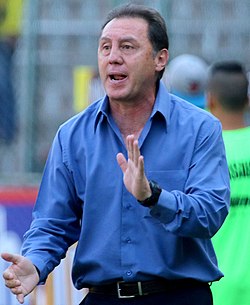
The CONCACAF Gold Cup is North America's major tournament in senior men's football and determines the continental champion. Until 1989, the tournament was known as CONCACAF Championship. It is currently held every two years. From 1996 to 2005, nations from other confederations have regularly joined the tournament as invitees. In earlier editions, the continental championship was held in different countries, but since the inception of the Gold Cup in 1991, the United States are constant hosts or co-hosts.
Contents
- Record at the CONCACAF Championship/Gold Cup
- Record
- Match overview
- 2002 CONCACAF Gold Cup
- Group stage
- Record players
- Goalscorers
- See also
- References
From 1973 to 1989, the tournament doubled as the confederation's World Cup qualification. CONCACAF's representative team at the FIFA Confederations Cup was decided by a play-off between the winners of the last two tournament editions in 2015 via the CONCACAF Cup, but was then discontinued along with the Confederations Cup.
Since the inaugural tournament in 1963, the Gold Cup was held 27 times and has been won by seven different nations, most often by Mexico (12 titles).
Ecuador have participated as invitees once, in 2002. After one victory and one defeat in the group stage, Ecuador was sent home with a stroke of bad luck; all three teams were equal on both points and goals, and lots were drawn to determine the teams' positions. Haiti and Canada were drawn into first and second place and advanced to the quarter-finals, while Ecuador were eliminated.
